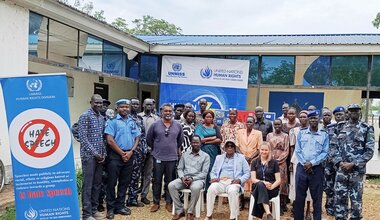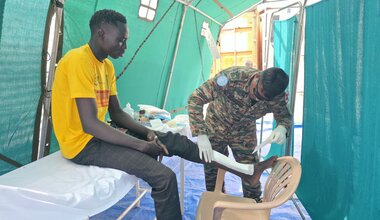Sexual exploitation unacceptable, UN official says
5 November 2012 - Sexual exploitation and abuse (SEA) violated a victim's dignity and human rights and are unacceptable in the UN system, an UNMISS official said today in Juba.
"Sexual exploitation means the exchange of goods, services, employment, or money for sexual favours," Nathalie Ndongo-Seh, Chief of UNMISS Conduct and Discipline Unit, told participants at the first of a series of SEA trainings, which will continue until 21 December.
"These are means to take advantage of the vulnerability of a person who desperately needs such assistance from the UN," she said.
"But sexual abuse is the actual or the threatened physical intrusion of a sexual nature such as rape, other forms of sexual assault, and sex with minors, which is statutory rape," said Ms. Ndongo-Seh, adding that SEA could result in a post-traumatic disorder as well as stigmatization of the victim by the local community.
She said SEA must be avoided as it subjected victims to more suffering, endangered the safety and security of UN workers, fractured the UN's relationship with host authorities, put the credibility and image of the UN in jeopardy, and violated the mission's mandate, which includes the protection of civilians.
But such behavior could be contained through nationwide awareness raising campaigns among local communities as well as sensitization of UN personnel who may be tempted to engage in such practices, Ms. Ndongo-Seh said.
She also noted that UN privileges and immunities did not cover actions related to sexual exploitation and sexual abuse.
Training participant Elizabeth Hillary, a senior logistics assistant at the World Food Programme, said she had learned about preventing SEA, which she was previously unaware of. "I believe that this will make a difference not only for me but also for my local community."
"It was a very good workshop for me -- very enriching, very enlightening and very interactive," said UN Police Officer Maruti Joshi.
The workshop drew participants from UNMISS military, police and civilians as well as from the South Sudanese gender and other relevant ministries.
 UN
UN United Nations Peacekeeping
United Nations Peacekeeping





